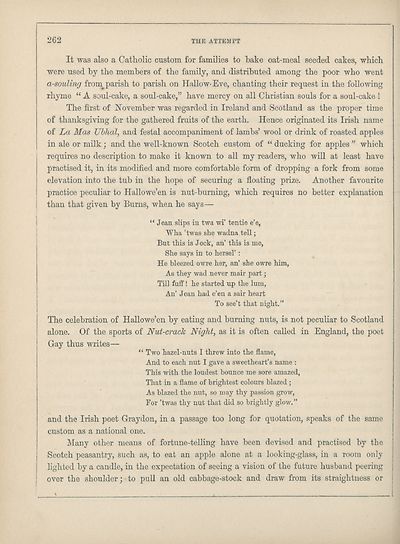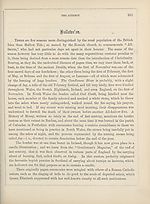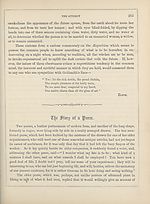Attempt > Volume 1 and Select writings
(274) Page 262
Download files
Complete book:
Individual page:
Thumbnail gallery: Grid view | List view

262
THE ATTEMPT
It was also a Catholic custom for families to hake oat-meal seeded cakes, which
were used by the members of the family, and distributed among the poor who went
a-souling fro in parish to parish on Hallow-Eve, chanting their request in the following
rhyme “ A soul-cake, a soul-cake,” have mercy on all Christian souls for a soul-cake !
The first of November was regarded in Ireland and Scotland as the proper time
of thanksgiving for the gathered fruits of the earth. Hence originated its Irish name
of La Mas Ubhal, and festal accompaniment of lambs’ wool or drink of roasted apples
in ale or milk; and the well-known Scotch custom of “ ducking for apples ” which
requires no description to make it known to all my readers, who will at least have
practised it, in its modified and more comfortable form of dropping a fork from some
elevation into the tub in the hope of securing a floating prize. Another favourite
practice peculiar to Hallowe’en is nut-burning, which requires no better explanation
! than that given by Burns, when he says—
“ Jean slips in twa wi’ tentie e’e,
Wha ’twas she vvadna tell;
But this is Jock, an’ this is me,
She says in to hersel’ :
He bleezed owre her, an’ she owre him,
As they wad never mair part;
Till fuff! he started up the lum,
An’ Jean had e’en a sair heart
To see’t that night.”
i
The celebration of Hallowe’en by eating and burning nuts, is not peculiar to Scotland
alone. Of the sports of Nut-crack Night, as it is often called in England, the poet
Gay thus writes—
“ Two hazel-nuts I threw into the flame.
And to each nut I gave a sweetheart’s name :
This with the loudest bounce me sore amazed,
That in a flame of brightest colours blazed ;
As blazed the nut, so may thy passion grow,
For ’twas thy nut that did so brightly glow.”
and the Irish poet Graydon, in a passage too long for quotation, speaks of the same
custom as a national one.
Many other means of fortune-telling have been devised and practised by the
Scotch peasantry, such as, to eat an apple alone at a looking-glass, in a room only
lighted by a candle, in the expectation of seeing a vision of the future husband peering
over the shoulder; to pull an old cabbage-stock and draw from its straightness or
THE ATTEMPT
It was also a Catholic custom for families to hake oat-meal seeded cakes, which
were used by the members of the family, and distributed among the poor who went
a-souling fro in parish to parish on Hallow-Eve, chanting their request in the following
rhyme “ A soul-cake, a soul-cake,” have mercy on all Christian souls for a soul-cake !
The first of November was regarded in Ireland and Scotland as the proper time
of thanksgiving for the gathered fruits of the earth. Hence originated its Irish name
of La Mas Ubhal, and festal accompaniment of lambs’ wool or drink of roasted apples
in ale or milk; and the well-known Scotch custom of “ ducking for apples ” which
requires no description to make it known to all my readers, who will at least have
practised it, in its modified and more comfortable form of dropping a fork from some
elevation into the tub in the hope of securing a floating prize. Another favourite
practice peculiar to Hallowe’en is nut-burning, which requires no better explanation
! than that given by Burns, when he says—
“ Jean slips in twa wi’ tentie e’e,
Wha ’twas she vvadna tell;
But this is Jock, an’ this is me,
She says in to hersel’ :
He bleezed owre her, an’ she owre him,
As they wad never mair part;
Till fuff! he started up the lum,
An’ Jean had e’en a sair heart
To see’t that night.”
i
The celebration of Hallowe’en by eating and burning nuts, is not peculiar to Scotland
alone. Of the sports of Nut-crack Night, as it is often called in England, the poet
Gay thus writes—
“ Two hazel-nuts I threw into the flame.
And to each nut I gave a sweetheart’s name :
This with the loudest bounce me sore amazed,
That in a flame of brightest colours blazed ;
As blazed the nut, so may thy passion grow,
For ’twas thy nut that did so brightly glow.”
and the Irish poet Graydon, in a passage too long for quotation, speaks of the same
custom as a national one.
Many other means of fortune-telling have been devised and practised by the
Scotch peasantry, such as, to eat an apple alone at a looking-glass, in a room only
lighted by a candle, in the expectation of seeing a vision of the future husband peering
over the shoulder; to pull an old cabbage-stock and draw from its straightness or
Set display mode to: Large image | Transcription
Images and transcriptions on this page, including medium image downloads, may be used under the Creative Commons Attribution 4.0 International Licence unless otherwise stated. ![]()
| Ladies' Edinburgh Debating Society publications > Attempt > Volume 1 and Select writings > (274) Page 262 |
|---|
| Permanent URL | https://digital.nls.uk/109868242 |
|---|
| Attribution and copyright: |
|
|---|

